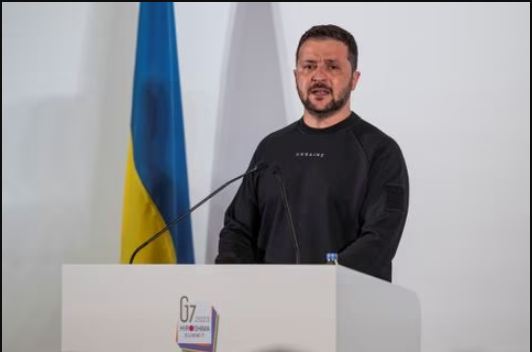Ukraine Faces Pressure to Consider U.S. Peace Framework Involving Territorial and Military Concessions
London – Ukraine is confronting renewed international pressure as the United States signals that Kyiv should consider a proposed framework to end the ongoing conflict with Russia.
According to individuals familiar with the discussions, the plan envisions Ukraine surrendering certain territories and reducing parts of its military capabilities as part of a negotiated settlement.
The proposal, shared discreetly with President Volodymyr Zelenskiy, outlines several concessions, including a smaller armed forces structure and limits on advanced weapons—measures Washington believes could help move the war toward resolution.
For Kyiv, the idea represents a significant shift at a time when Russian forces continue to make gains in eastern regions, putting Ukraine in a challenging position both militarily and politically.
The reported framework has not been publicly confirmed by U.S. officials, but American leaders have emphasized the need for realistic ideas from all sides to reach a durable peace.
Ukraine, which was not involved in drafting the terms, has been receiving indirect indications that Washington is exploring potential endgame scenarios, some of which have already been discussed with Russia, according to senior government figures.
Zelenskiy, who met with President Tayyip Erdogan in Ankara as part of a new diplomatic push, has called for strong and coordinated international engagement to support peace efforts.
He stated that U.S. leadership remains essential to ending the conflict, emphasizing that only Washington has the influence and resources required to steer negotiations effectively.
During his Ankara visit, Zelenskiy noted that Turkey had proposed alternative formats for future talks, highlighting Ankara’s continued role as a diplomatic facilitator.
Erdogan reaffirmed Turkey’s readiness to provide a platform for negotiation, reflecting its long-standing position as a mediator between Moscow and Kyiv.
Zelenskiy is scheduled to meet U.S. Army officials in Kyiv, a meeting expected to address both military support and emerging diplomatic considerations.
The renewed peace push has already had financial repercussions, triggering one of the largest increases in Ukrainian government bond prices in months as investors reacted to the possibility of progress.
Meanwhile, there have been no in-person negotiations between Russia and Ukraine since talks in Istanbul earlier this year, and Russian military operations have continued, including overnight strikes that left multiple casualties.
Ukraine’s leadership has so far avoided publicly acknowledging any forced concessions, maintaining that peace must not come at the cost of sovereignty or long-term security.
However, the political climate in Kyiv has become increasingly complex, with Zelenskiy confronting domestic challenges such as recent ministerial dismissals linked to corruption concerns.
International observers say the pressure on Kyiv reflects shifting global priorities, as the conflict approaches its fourth year and major powers explore a path toward stability.
U.S. officials insist that any final settlement must involve compromises from both sides, framing the current proposals as part of broader efforts to gather “realistic” options for ending the war.
Kyiv remains cautious about publicly embracing any externally crafted framework, particularly one that involves territorial changes or reductions in defense capacity.
Ukrainian officials have reiterated that peace cannot be imposed from the outside, and that any agreement must reflect Ukraine’s national interests and long-term security.
The coming weeks are expected to bring heightened diplomatic activity, with multiple nations signaling readiness to support or host negotiations.
The effectiveness of these efforts will depend on the willingness of both Kyiv and Moscow to engage, as well as the stance of global powers shaping the broader strategic environment.
At this stage, it remains unclear whether the U.S. proposal will gain traction, or whether Kyiv will be able to negotiate adjustments to avoid major territorial or military compromises.
For now, the situation highlights a delicate moment in the conflict, with Ukraine balancing battlefield realities, international expectations and domestic pressures as it navigates the next phase of the war.



